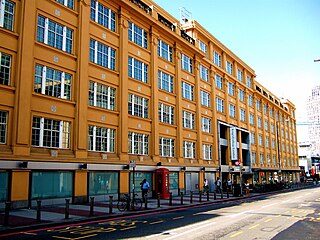
The Royal London Hospital is a large teaching hospital in Whitechapel in the London Borough of Tower Hamlets. It is part of Barts Health NHS Trust. It provides district general hospital services for the City of London and Tower Hamlets and specialist tertiary care services for patients from across London and elsewhere. The current hospital building has 1248 beds and 34 wards. It opened in February 2012.

The Florence Nightingale Faculty of Nursing, Midwifery & Palliative Care is an academic faculty within King's College London. The faculty is the world's first nursing school to be continuously connected to a fully serving hospital and medical school. Established on 9 July 1860 by Florence Nightingale, the founder of modern nursing, it was a model for many similar training schools through the UK, Commonwealth and other countries for the latter half of the 19th century. It is primarily concerned with the education of people to become nurses and midwives. It also carries out nursing research, continuing professional development and postgraduate programmes. The Faculty forms part of the Waterloo campus on the South Bank of the River Thames and is now one of the largest faculties in the university.

Matron is the job title of a very senior or the chief nurse in several countries, including the United Kingdom, and other Commonwealth countries and former colonies.

Ethel Gordon Fenwick was a British nurse who played a major role in the History of Nursing in the United Kingdom. She campaigned to procure a nationally recognised certificate for nursing, to safeguard the title "Nurse", and lobbied Parliament to pass a law to control nursing and limit it to "registered" nurses only.

City Hospital is a major hospital located in Birmingham, England, operated by the Sandwell and West Birmingham Hospitals NHS Trust. It provides an extensive range of general and specialist hospital services. It is located in the Winson Green area of the west of the city.
Justus Akinbayo Akinsanya, FRCN was a nurse, human biologist, nurse educator and researcher.

Dame Emma Maud McCarthy, was a nursing sister and British Army matron-in-chief.

Dame Alicia Frances Jane Lloyd Still, was a British nurse, teacher, hospital matron and leader of her profession. She was one of the leaders in the campaign for state registration of nurses. Following the Nurses Registration Act 1919, she was a member of the General Nursing Council (1920-1937). As chairwoman of the General Nursing Council's first Education and Examinations Committee she helped establish the first national examination standards for the registration of nurses.

Eva Charlotte Ellis Luckes was matron of the London Hospital from 1880 to 1919.

Comfort Iyabo Amah Momoh, is a British midwife who specializes in the treatment of female genital mutilation (FGM). Born in Nigeria, Momoh is a member of the British FGM national clinical group, established in 2007 to train health professionals in how to deal with the practice. Until 2017 she served as a public-health specialist at Guy's and St Thomas' NHS Foundation Trust in London. She is the editor of Female Genital Mutilation (2005).

University College Hospital, Ibadan (UCH) is a federal teaching hospital in Ibadan, Nigeria attached to the University of Ibadan.

Sarah Elizabeth Wardroper was an English nurse who was matron of St Thomas' Hospital, London, and the first superintendent of the Nightingale School of Nursing at that hospital.
The history of nursing in the United Kingdom relates to the development of the profession since the 1850s. The history of nursing itself dates back to ancient history, when the sick were cared for in temples and places of worship. In the early Christian era, nursing in the United Kingdom was undertaken by certain women in the Christian Church, their services being extended to patients in their homes. These women had no real training by today's standards, but experience taught them valuable skills, especially in the use of herbs and folk drugs, and some gained fame as the physicians of their era. Remnants of the religious nature of nurses remains in Britain today, especially with the retention of the job title "Sister" for a senior female nurse.
The Nursing and Midwifery Council of Nigeria, is the sole governing body that regulates all cadres of nurses and midwives in Nigeria. It was established by government decree in 1979, and re-established as a parastatal by the government of Nigeria by Act Cap. No 143 Laws of the Federation of Nigeria, 2004.

Highgate Hospital was a name used to refer to the infirmary building which opened in 1869 on the St Pancras side of Dartmouth Park Hill in Highgate, London.
Chief Daniel Conrad Taiwo, alias Taiwo Olowo, was a trader, arms dealer, slave owner, political power broker, philanthropist and community leader in Colonial Lagos.
Dame Katherine Christie Watt, was a British military nurse, nursing administrator and civil servant.
St Anne's School, Ibadan is a secondary school for girls in Ibadan, Nigeria. The school took its current name in 1950, after a merger between Kudeti Girls School, founded in 1899, and CMS Girls School, Lagos, founded in 1869. It can therefore claim to be the oldest girls secondary school in Nigeria.












